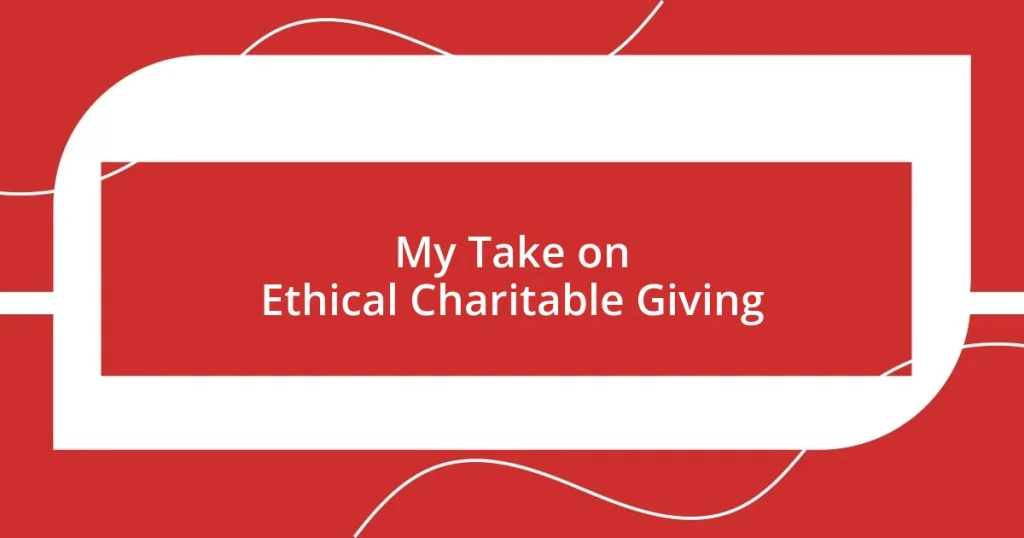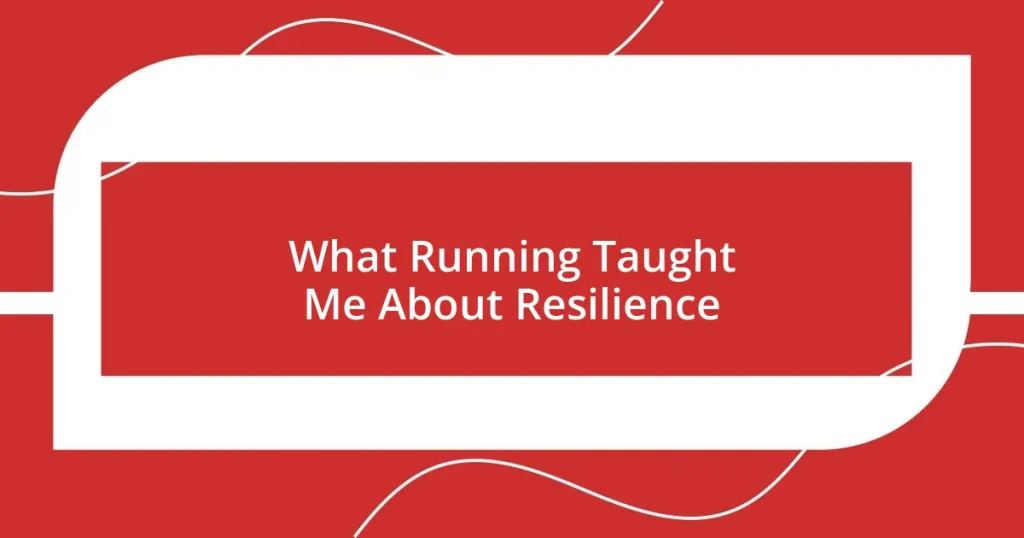Key takeaways:
- Ethical charitable giving emphasizes transparency, accountability, and understanding community needs to create a meaningful impact.
- Aligning personal values with charitable causes enhances engagement and fosters genuine partnerships.
- Long-term commitment to giving builds trust with organizations, allowing donors to witness the real impact of their contributions.
- Engaging in hands-on volunteer work and sharing experiences can inspire community involvement and collective action in philanthropy.
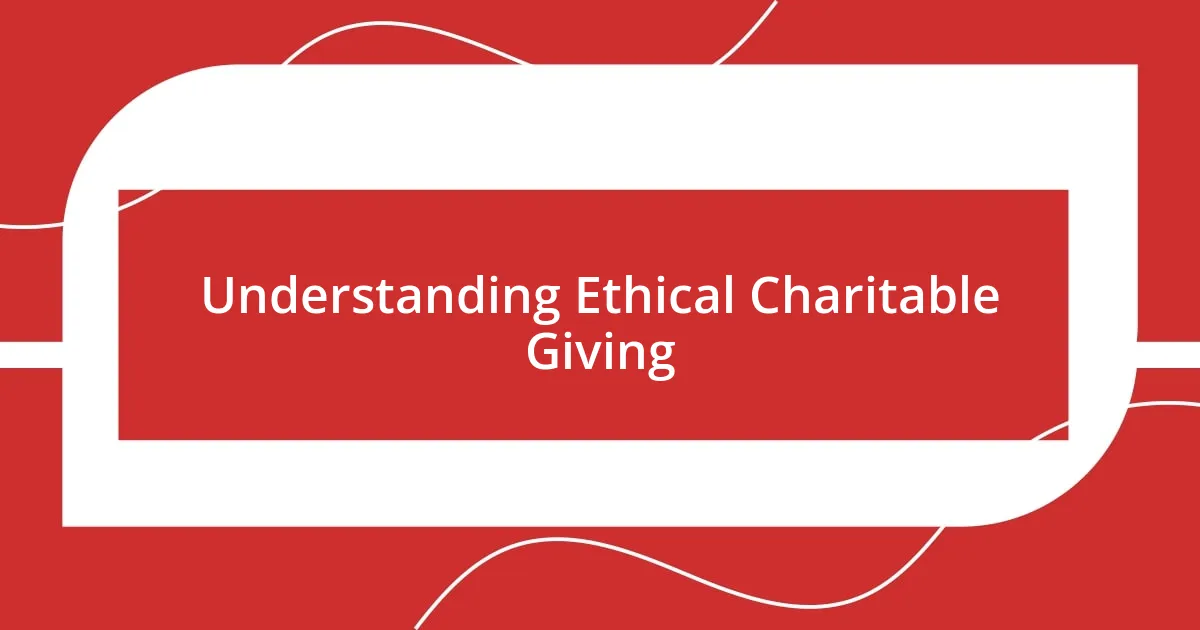
Understanding Ethical Charitable Giving
Ethical charitable giving goes beyond simply donating money; it encompasses a thoughtful approach to how our contributions impact the world. I still remember my first experience volunteering at a local shelter. The gratitude in the eyes of those we served taught me that giving isn’t just about financial support but about connecting deeply with the communities we aim to help.
When we think about ethical charitable giving, we should consider how transparency and accountability influence our choices. Have you ever wondered where your donation really goes? I made my fair share of hasty donations in the past, only to later discover that the organizations didn’t have systems in place to utilize funds effectively. That experience transformed my perspective, leading me to focus on research and find organizations that not only serve their mission but also communicate their impact openly.
Moreover, ethical giving involves understanding the long-term effects of our generosity. For instance, I once supported an education initiative that, while well-intentioned, inadvertently created dependency rather than empowering self-sufficiency. This realization sparked my passion for sustainable practices in philanthropy, reminding me that true help often includes lifting others up to become self-reliant and resilient. It’s essential to ask ourselves: Are we truly making a difference or just scratching the surface of a much deeper issue?
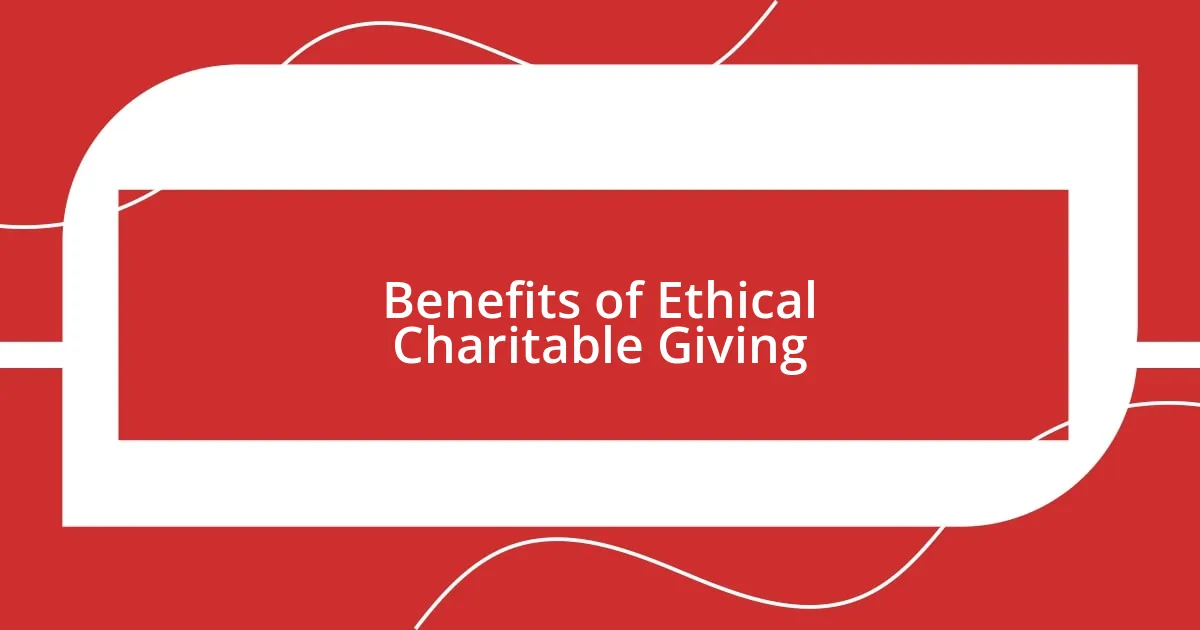
Benefits of Ethical Charitable Giving
Engaging in ethical charitable giving can yield profound benefits, not just for the causes we support but for ourselves as well. I’ve experienced a sense of fulfillment that goes beyond any material reward when I’ve seen the tangible impact of my contributions. This deeper connection fuels a desire to give more thoughtfully, creating a fulfilling cycle of generosity and gratitude.
- Promotes more informed decision-making about where to donate.
- Fosters relationships with organizations that share similar values.
- Encourages a sense of community and collective action among supporters.
- Enhances personal satisfaction by aligning actions with one’s ethical beliefs.
- Increases accountability and transparency within charitable organizations.
Understanding these benefits has changed how I approach giving; it has turned a once-overwhelming choice into a rewarding journey that continually inspires personal growth. Each act of giving has the potential to forge deeper emotional ties—it’s not just about making a donation but about being part of a movement that prioritizes integrity and compassion.
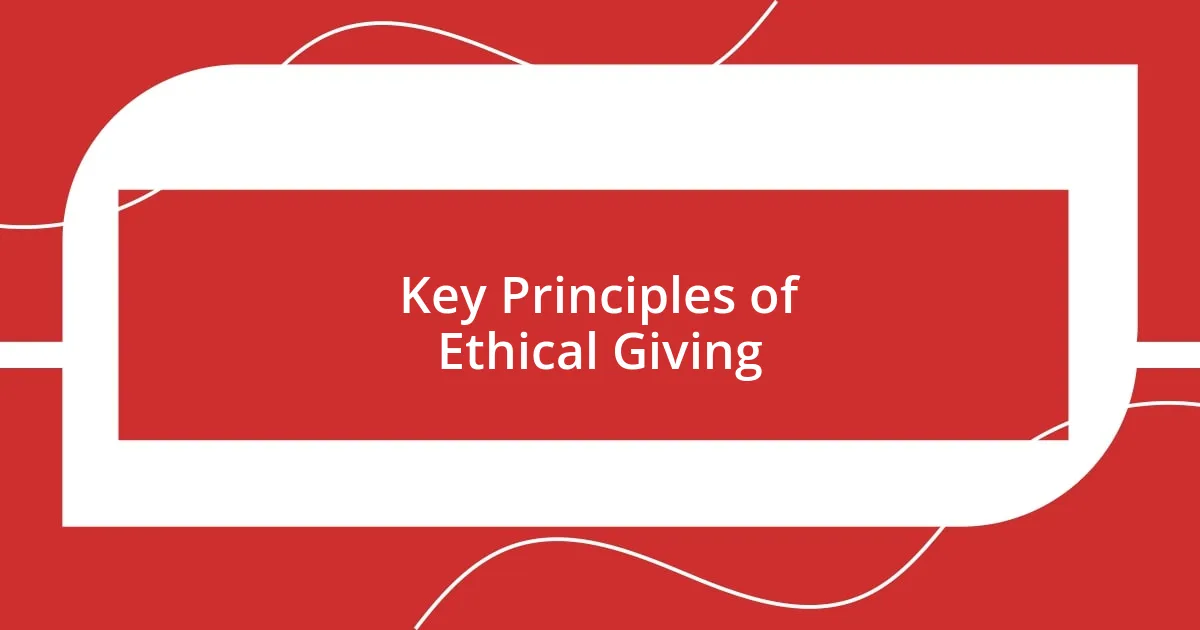
Key Principles of Ethical Giving
When we think about ethical charitable giving, one key principle stands out: alignment with values. From my experience, it’s vital to give to causes that resonate with your personal beliefs. For instance, when I began supporting environmental initiatives, I felt an immediate connection. It wasn’t just about contributions; it was about advocating for a cause that mattered deeply to me. This alignment made my engagement feel less like charity and more like a partnership.
Another principle to consider is understanding community needs. During a project in a rural area, I learned that the best approach isn’t always to impose our ideas of help but to listen and understand local perspectives. Over time, I tailored my support to what the community identified as their priority. Seeing them thrive from the resources they genuinely wanted was incredibly rewarding. It reinforced my belief that ethical giving is about fostering empowerment rather than merely providing aid.
Lastly, transparency and accountability can’t be ignored. I’ve closely followed organizations that provide detailed reports on how they allocate funds. One time, I chose to support a charity after seeing their open communication about the specific impacts of donations. Knowing where my money went made the experience more meaningful. It reminds me that ethical giving involves not just financial exchange but a trust-based relationship with the organizations we support.
| Key Principle | Description |
|---|---|
| Alignment with Values | Giving to causes that resonate with personal beliefs enhances engagement and makes the support feel more meaningful. |
| Understanding Community Needs | Listening to local perspectives ensures that the support offered is genuinely beneficial, fostering empowerment over dependency. |
| Transparency and Accountability | Organizations that openly communicate their fund allocation help build trust, making the giving experience more impactful. |
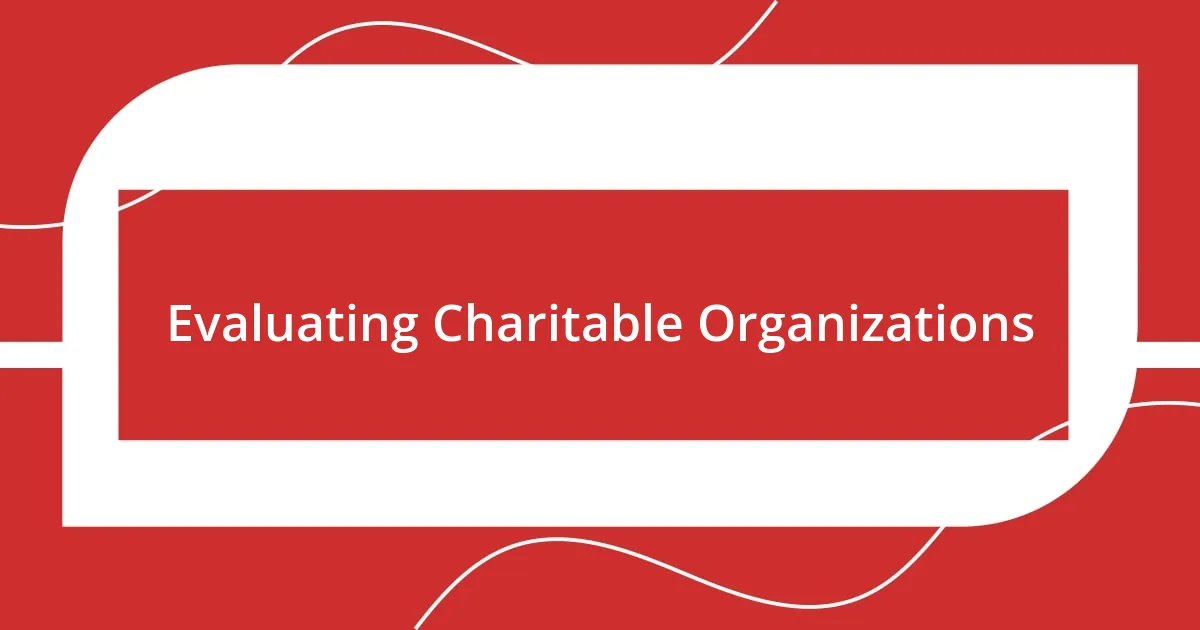
Evaluating Charitable Organizations
To evaluate charitable organizations effectively, start by scrutinizing their impact reports. I remember when I contributed to a small local charity; I eagerly awaited their annual report. It turned out they provided a clearer picture of their accomplishments than I had anticipated, showcasing not just numbers but also stories of individuals they helped. This made me feel like a part of something larger, and it reaffirmed my decision to invest in their mission.
Look for independent reviews and ratings too. In my search for reputable organizations, I stumbled upon platforms that rate charities based on transparency and effectiveness. One organization I supported had impressive ratings, which brought me peace of mind; the validation from an outside source gave me confidence that my donations were making a real difference. Have you ever been swayed by someone else’s endorsement? This experience highlighted how outside validation can strengthen our trust in charitable giving.
Lastly, consider reaching out directly to these organizations. I once had a conversation with the director of a charity I was interested in. Their genuine passion and willingness to answer my questions made all the difference. Engaging directly not only provides insight into their operations but also establishes a connection that goes beyond financial support. Isn’t it reassuring to talk to someone who shares your commitment?
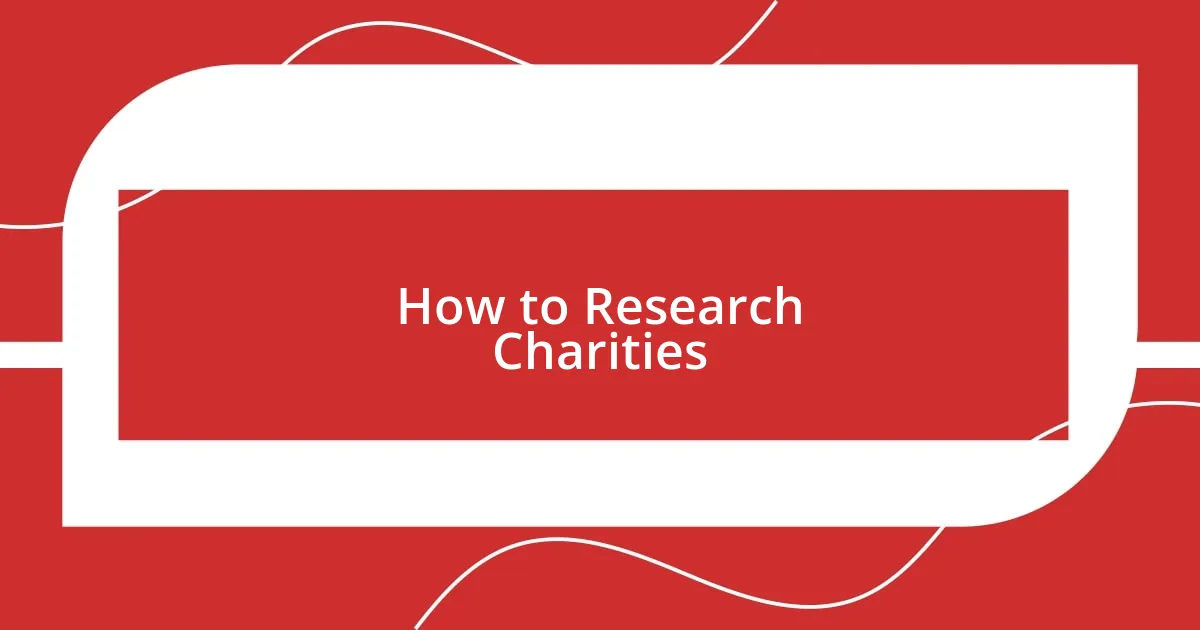
How to Research Charities
When researching charities, a great starting point is to visit their websites and look for key information. I once spent hours poring over the website of a charity I was considering supporting. The clarity of their mission and the visible impact of their work truly captivated me. Does the organization provide detailed updates about their projects? Understanding their goals and accomplishments can really help assess their credibility.
Don’t hesitate to check third-party charity evaluators. I remember being pleasantly surprised when I discovered a site that rated charities based on their financial health and transparency. It was reassuring to see that the organization I wanted to back had excellent ratings, confirming that they utilized donations wisely. Isn’t it comforting to know that there are tools out there to help us make informed decisions?
Lastly, personal testimonials and stories can be incredibly enlightening. A friend once shared her experience volunteering for a cause she was passionate about. Her heartfelt stories about the people they served made me pause and think—aren’t those personal connections what charity is all about? Hearing firsthand accounts can offer insights that numbers sometimes fail to convey, reinforcing your belief in the mission you’re considering supporting.
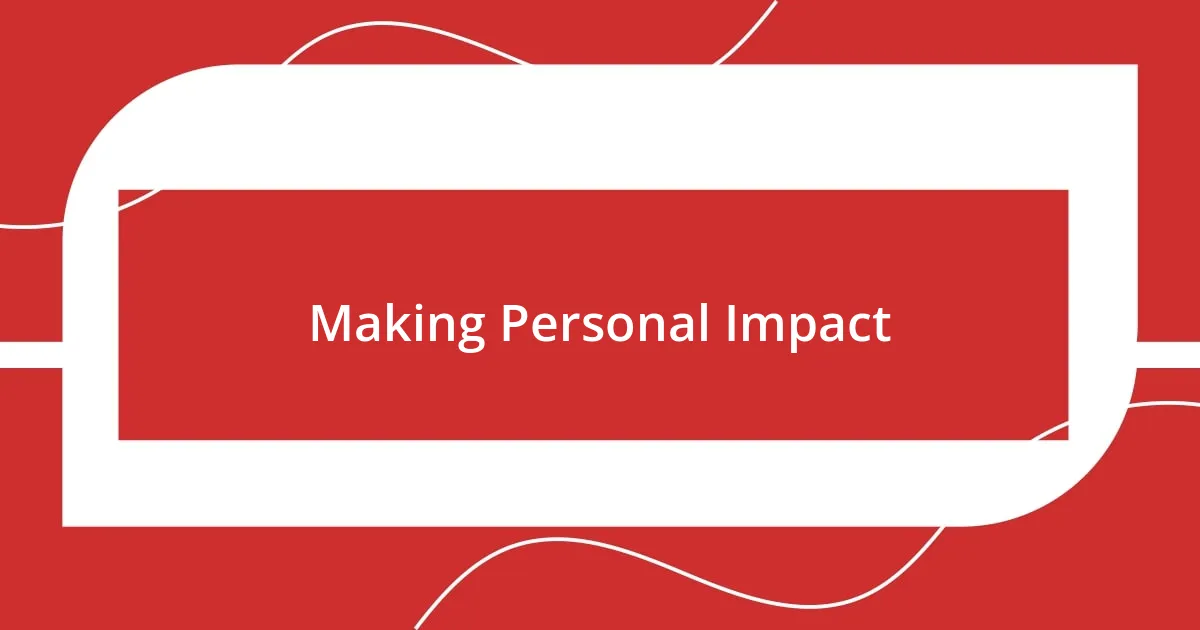
Making Personal Impact
Making a personal impact in charitable giving often starts with understanding your values. I once reflected on what causes truly resonated with me, and it was eye-opening. When I chose to donate to environmental initiatives, I felt a surge of connection because I’ve always loved nature. Have you thought about which causes hit closest to home for you? Identifying your passion can guide you toward organizations that align with your beliefs, making your contribution feel more meaningful.
Engaging in hands-on volunteering can amplify the impact of your donations. I vividly remember spending a weekend serving meals at a local shelter. It was humbling to see the direct effects of our efforts; the smiles and gratitude from those we helped were unforgettable. It made me realize that giving isn’t just about money—it’s about time and presence too. Have you ever considered how your skills and time could serve those in need? Sometimes, a simple act of kindness can create ripples of change that far exceed financial contributions.
Lastly, sharing your charitable experiences with others can inspire collective action. When I opened up about my volunteer work on social media, I was surprised by the response. Friends reached out, asking how they could get involved or donate, creating a small community of support. Isn’t it powerful how our stories can motivate others? By making your impact visible, you encourage a culture of giving that extends far beyond your individual efforts.
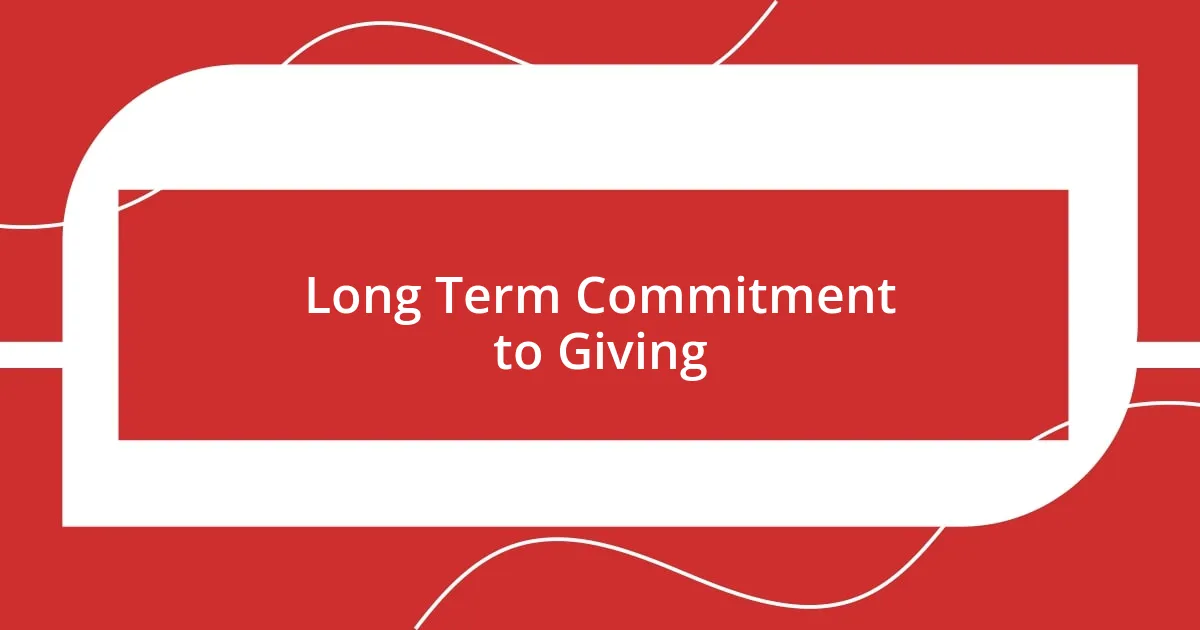
Long Term Commitment to Giving
Long-term commitment to giving is about nurturing relationships with the causes that resonate with us the most. I recall committing to support a local animal shelter for several years. With every passing year, I not only saw the impact of my contributions but also developed a connection with the staff and the animals I helped. Doesn’t it feel rewarding to witness the growth of a cause you believe in over time, knowing that your support has played a role in its evolution?
In my experience, consistent giving allows us to build trust with the organizations we choose to support. When I started to contribute monthly to a literacy nonprofit, I received periodic updates that detailed how my funds were being utilized. It was enlightening to see the direct correlation between my commitments and their accomplishments, like increased reading programs in underserved communities. Can you imagine the pride in knowing that your ongoing support is shaping lives?
Moreover, committing to give long-term fosters a deeper understanding of the issues at hand. A few years back, I engaged with a charity focused on mental health, and as I continued to contribute, I began to learn about the complexities and stigma surrounding mental health issues. This knowledge transformed my perspective and spurred me to advocate for mental health in my community. Don’t you think that a sustained commitment allows us to grow individually while making a tangible difference?










